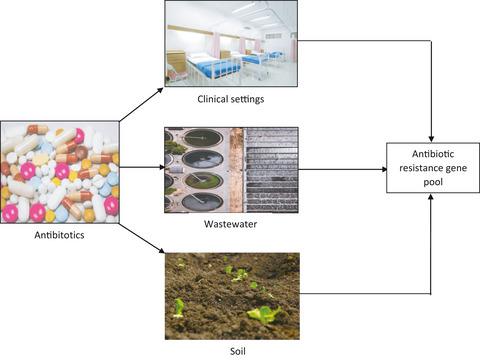当前位置:
X-MOL 学术
›
Microbiologyopen
›
论文详情
Our official English website, www.x-mol.net, welcomes your feedback! (Note: you will need to create a separate account there.)
Environmental hotspots for antibiotic resistance genes
MicrobiologyOpen ( IF 3.4 ) Pub Date : 2021-05-15 , DOI: 10.1002/mbo3.1197 Shalini Kunhikannan 1, 2 , Colleen J Thomas 1 , Ashley E Franks 1 , Sumana Mahadevaiah 2 , Sumana Kumar 3 , Steve Petrovski 1
MicrobiologyOpen ( IF 3.4 ) Pub Date : 2021-05-15 , DOI: 10.1002/mbo3.1197 Shalini Kunhikannan 1, 2 , Colleen J Thomas 1 , Ashley E Franks 1 , Sumana Mahadevaiah 2 , Sumana Kumar 3 , Steve Petrovski 1
Affiliation

|
Bacterial resistance toward broad‐spectrum antibiotics has become a major concern in recent years. The threat posed by the infectious bacteria and the pace with which resistance determinants are transmitted needs to be deciphered. Soil and water contain unique and diverse microbial communities as well as pools of naturally occurring antibiotics resistant genes. Overuse of antibiotics along with poor sanitary practices expose these indigenous microbial communities to antibiotic resistance genes from other bacteria and accelerate the process of acquisition and dissemination. Clinical settings, where most antibiotics are prescribed, are hypothesized to serve as a major hotspot. The predisposition of the surrounding environments to a pool of antibiotic‐resistant bacteria facilitates rapid antibiotic resistance among the indigenous microbiota in the soil, water, and clinical environments via horizontal gene transfer. This provides favorable conditions for the development of more multidrug‐resistant pathogens. Limitations in detecting gene transfer mechanisms have likely left us underestimating the role played by the surrounding environmental hotspots in the emergence of multidrug‐resistant bacteria. This review aims to identify the major drivers responsible for the spread of antibiotic resistance and hotspots responsible for the acquisition of antibiotic resistance genes.
中文翻译:

抗生素抗性基因的环境热点
近年来,细菌对广谱抗生素的耐药性已成为一个主要问题。感染性细菌造成的威胁以及耐药性决定因素的传播速度需要被破解。土壤和水含有独特且多样化的微生物群落以及天然存在的抗生素抗性基因库。抗生素的过度使用以及不良的卫生习惯使这些本土微生物群落暴露于来自其他细菌的抗生素抗性基因,并加速了获得和传播的过程。据推测,大多数抗生素处方使用的临床环境是一个主要热点。周围环境容易产生抗生素耐药性细菌,通过水平基因转移,促进土壤、水和临床环境中的本土微生物群快速产生抗生素耐药性。这为更多多重耐药病原体的发展提供了有利条件。检测基因转移机制的局限性可能使我们低估了周围环境热点在多重耐药细菌出现中所发挥的作用。本综述旨在确定导致抗生素耐药性传播的主要驱动因素以及导致抗生素耐药性基因获得的热点。
更新日期:2021-05-17
中文翻译:

抗生素抗性基因的环境热点
近年来,细菌对广谱抗生素的耐药性已成为一个主要问题。感染性细菌造成的威胁以及耐药性决定因素的传播速度需要被破解。土壤和水含有独特且多样化的微生物群落以及天然存在的抗生素抗性基因库。抗生素的过度使用以及不良的卫生习惯使这些本土微生物群落暴露于来自其他细菌的抗生素抗性基因,并加速了获得和传播的过程。据推测,大多数抗生素处方使用的临床环境是一个主要热点。周围环境容易产生抗生素耐药性细菌,通过水平基因转移,促进土壤、水和临床环境中的本土微生物群快速产生抗生素耐药性。这为更多多重耐药病原体的发展提供了有利条件。检测基因转移机制的局限性可能使我们低估了周围环境热点在多重耐药细菌出现中所发挥的作用。本综述旨在确定导致抗生素耐药性传播的主要驱动因素以及导致抗生素耐药性基因获得的热点。



























 京公网安备 11010802027423号
京公网安备 11010802027423号